Konkani Patholi/ Arasina Yele Kadabu/ Sweet Dumpling Steamed in Turmeric Leaves Step by Step Recipe
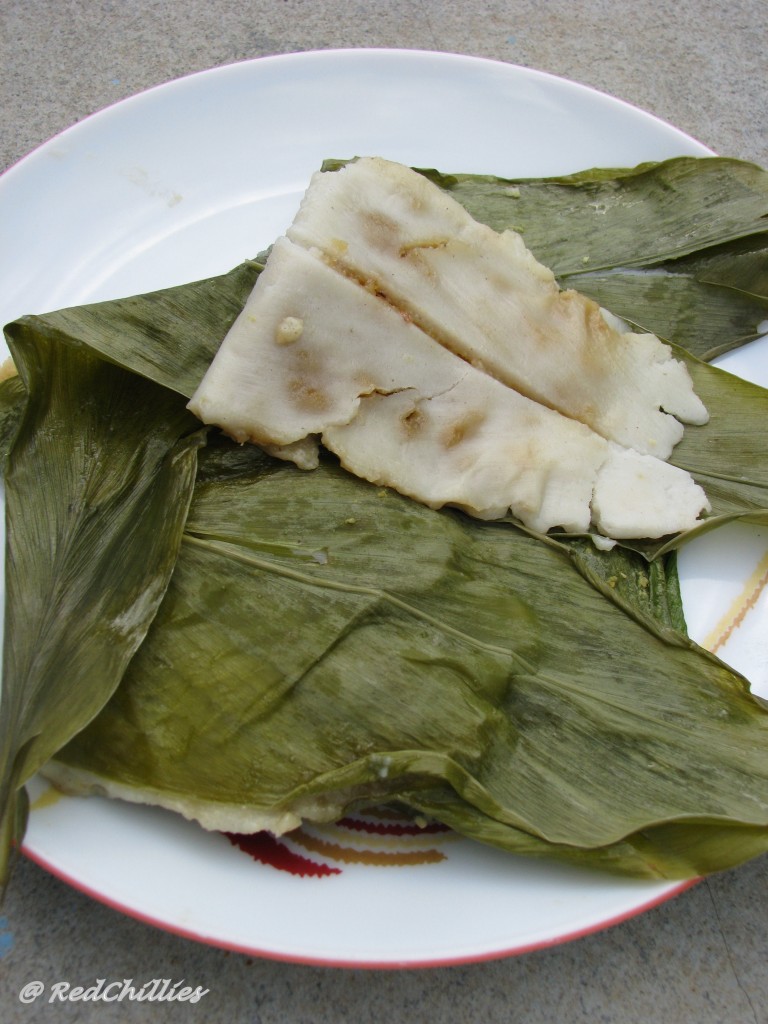
Patholi (in Konkani) is a traditional dessert made during festivals or special occasions. Dumpling made of rice flour is stuffed with coconut jaggery mixture and steamed in turmeric eaves. The key component while making this are the special turmeric leaves. The flavor of the turmeric leaf is infused into the patholi while it is steaming, giving the dish a flavorful aroma.
As I understand it is referred to as Hoorulu kadabu or Arasina Yele kadabu in Kannada and Ilayada in Malayalam. This is not to be confused with the crumbled daal curry referred to as Patoli or Usli in South Indian homes.
Kadabu/patholi is considered a favorite of Lord Ganapathi and it is therefore prepared that day along with plethora of other delicious traditional items.
This special dish was prepared when we were in India (of course). We landed on the day of Gowri/ Ganesha Pooja celebrations and got to be part of the festivities. Imagine the joy in our hearts that day! We not only got to see our parents and family, we got to be part of a festival and of course most importantly we got to eat foods that are not available here or difficult to make here.
I know this is a long recipe and the process is time consuming as well. First the coconut mixture needs to be prepared, followed by rice flour dough. This needs to be applied to turmeric leaves and then steamed. But trust me the effort is worth every bit of it. The taste and the heavenly aroma when you bite into it is totally indescribable.
Substitutes for turmeric leaves:
Quite frankly there is no substitute for turmeric leaves, but then they are a specialty and not available in regular stores. Even in Bangalore they are available in select stores known as Mangalore stores. Anyway
- Banana leaves can be used as substitute. Here is one such example.
- Using parchment paper (obviously the aroma will not be there).
- Make kadabus without any leaves or parchment paper. Like here.
Ingredients
Outer covering/wrapper
- 1 cup rice flour
- 1 cup water
- little salt
- 1 tsp oil
Jaggery Coconut filling
- 1 cup shredded coconut (preferably fresh)
- 1/2 cup powdered jaggery
- ½ tsp powdered cardamom
Method
- Rice flour dough: In another vessel, heat water and bring it to a boil. Add little oil and salt. Now add the rice flour to the water and keep stirring well, ensuring that no lumps are formed. Close a lid and turn off heat. After about 5 minutes, open the lid and use all the steam on the lid to the rice flour mixture and make dough (like a chapathi dough). This will be little sticky.
- Coconut Jaggery mixture/ Churna: In a heavy bottomed pan, on medium heat add the coconut and jaggery. Mix until the jaggery blends with coconut and forms a gooey mixture. Add cardamom to this and mix well. Turn off the heat and allow the mixture to cool.
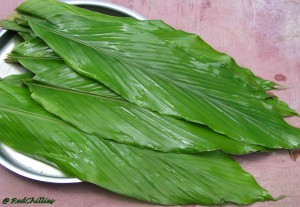
· Clean and dry the turmeric leaves. Keep the dough and filling handy. Also keep a small cup of water handy
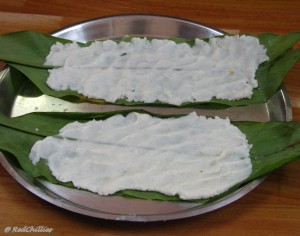
- Take a turmeric leaf with vein side facing down. Spread about a tablespoon of dough of the leaf. Use little water to spread it along. Pat as required.
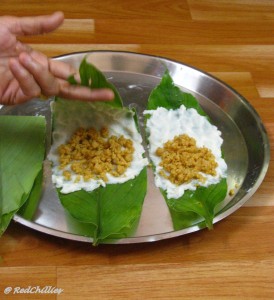
- Place about a tablespoon of coconut filling on one side starting from the center to the tip.
- Fold the leaf horizontally as shown.
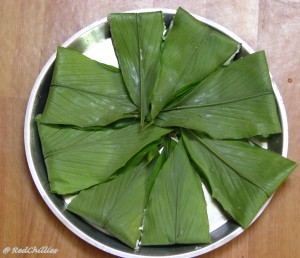
Repeat this procedure with the remaining leaves and place them on a plate.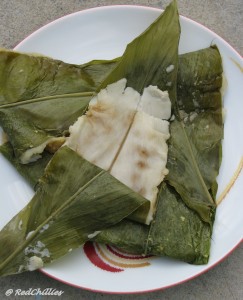
- Steam cook the Patholi in the cooker for about 12-15 minutes
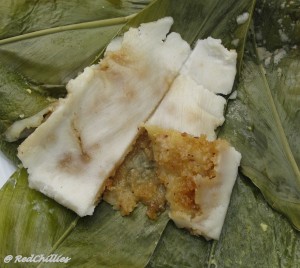
- Set them aside for 10 minutes, before peeling off the leaves. ( I peeled them off a bit too soon, hence the dough is sticking to the leaf).
- Serve when it is warm along with ghee or as is. The taste and aroma are heavenly!

Those look lovely. Thanks for pointing to all the links for banana leaf, parchment paper etc usage. Cheers!
The process is lengthy but I am sure the end result is divine
We love this sweet. I used to ask my neighbor to always make this when I was staying in Goa. I miss it now!
Hi,
That is a new recipe to me but it sure looks yumm…:)
Dr.Sameena
I have been craving for patholi for so many years now. Maybe I should grow the turmeric plant in a pot. But in our house we made a coarse paste of rice along with coconut ( some add a little beaten rice) and the paste is smeared on the leaf on both sides and the coconut filling is placed on one leaf and folded over it and steamed.
This is a delight RC. The aroma from the turmeric leaves. I can imagine. My grandparents farm had an abundance of turmeric leaves. I must ask my grandma if they ever used it to cook anything.
Patholi made with turmeric leaves is totally out of this world, surely you must have enjoyed them. I remember helping my mom n aunts to make these for chaturthi.
I make them with parchement paper as turmeric leaves are not available here.
Wow! This is outstanding. A very new dish to me… loved the way you made it and am sure must have tasted great too 🙂
Nice looking patholis Supriya…I have prepared it with banana leaves but nothing to beat the taste when it is prepared with haldi paan. I am glad you got to have it !
First time am seeing turmeric leaves… sounds aromatic n delicious..
Nice stepwise….this sounds so flavourful n tasty
Lovely recipe…we make a similar sweet in Kerala however, steamed inside banana leaves. Thks for sharing the recipe
Love the patholis here. Very well described method. Love the photos.
This sounds so immensely exotic. first i have never seen a turmeric leaf, second: did not even know that it has culinary use or flavor. last – I am floored by the flavors and the complexities and want to taste it now.
my comment is not showing up 🙁
well it did now.. sorry to take up so much space
Pingback: Konkani Patholi « Life.Here.And.There
It’s difficult to find haldi leaves in the US. But the actual taste and the aroma is from the haldi leaf. I have a small tip and this is how I do my Patholi in the US. When ever I visit India I dry up a lot of haldi leaves and bring it with me to the US. I use Banana leaf instead of the whole haldi leaf and then I spread a tablespoon of the dough on to the banana leaf ,then the coconut filling and 1 dried haldi leaf. Then fold the banana leaf and steam for 12 – 14 mins.It will taste exactly the same as haldi leaf patholi.
(Wrap dried haldi leaves in a paper towel and place them in a zip lock bag and refrigerate, but check periodacally for any fungas in the leaf.)
Bharthi thanks for the very awesome idea. I cannot beleive how clever and easy the idea is. One questions though: does the dried haldi leaf have the same aroma as the fres one’s ?
Do you think it will work well with corn husk? similar to preparing tamales and since corn husks are widely available in grocery stores.
Bharthi, I have not used corn husk and I think corn husk might not add any flavor to the dumpling. Do let me know if it works for you 🙂
I came across your blog site on yahoo and google and check several of your early on posts. Continue to maintain the great operate. I just additional upward your Rss to our MSN Information Reader. Seeking ahead to reading through more through GuildWars2 Necromancer down the road!
Pingback: Ganesh Chathurthi /Vinayaka Chavthi Sweets Recipes | RedChillies
Thanks for the recipe. I had turmeric plant at home. So tried this recipe today with the leaves. It was really awesome.
The post is written in very a good manner and it entails many useful information for me. I am happy to find your distinguished way of writing the post. Now you make it easy for me to understand and implement the concept.
I have a solution for acquiring turmeric leaves. Plant turmeric roots in early spring either in a big pot or on the ground. You should get a good amount of leaves by August 15th. Cut leaves as needed. At the end of the season before the first frosting bring the plant pot indoors or dig out the root from the ground. Keep the root in the soil indoors. Do not water it.till early spring. .